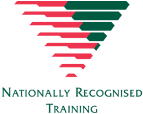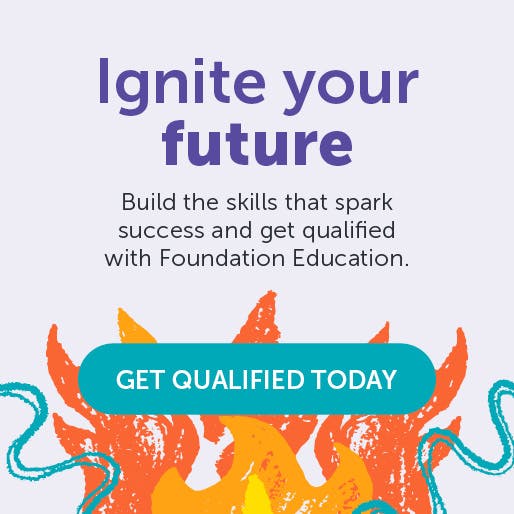Broaden your opportunities with a Diploma of Early Childhood Education and Care
If you’re already working in a childcare setting, this advanced qualification will give you the skills you need to progress your career and become eligible for more senior roles.
By completing a Diploma of Early Childhood Education and Care, you’ll be able to build on the experience you already have, and develop the skills you need to design and implement early childhood education and care programs. You’ll learn how to build a positive culture and lead teams in the workplace. You’ll develop the skills required to nurture creativity in children, to work in partnership with children’s families, and much more.
Your career opportunities will expand once you have achieved this qualification. Graduates will be eligible for a variety of roles in early childhood education such as Lead Educator, Group Leader or Childcare Director.
With the need for childcare expected to expand over the coming years, a Diploma of Early Childhood Education and Care will help you establish a long-lasting and rewarding career as an early childhood educator and a leader.
The Diploma of Early Childhood Education and Care is delivered online and includes 280 hours of practical placement work in a regulated children’s education and care service in Australia.
The CHC50121 Diploma of Early Childhood Education and Care is a Nationally Recognised course.
Course Outcomes
The opportunities available to you upon completion of the CHC50121 Diploma of Early Childhood Education and Care will be leadership roles of varying degrees that can enable you to continue to develop your own skills as well as enrich the careers of others you may mentor. The below roles are just some of the potential course outcomes.

Group Leader
A Child Care Group Leader takes responsibility for the planning, implementation and evaluation of the daily education program. As a Child Care Group Leader, you will lead the preparation of materials and equipment to support children’s learning, play and development. You’ll also be responsible for monitoring, assessing and documenting the children's individual progress. You’ll ensure the health and safety of children, support the inclusion of all children and develop positive and respectful relationships with the children in your care.

Childcare Director
As Childcare Director, you’ll occupy the most senior position at a childcare centre and be responsible for managing the day-to-day operations. You’ll ensure a safe and educational environment for young children, manage childcare educators, develop learning programs in coordination with your team and communicate with parents. Your key duties will include the overall planning, administration, marketing and resourcing of the centre.

Educational Leader
The role of Educational Leader within an early childhood learning environment is primarily about guiding and developing educators’ and families’ understandings about play and leisure-based learning, and the significance of the early years in the education continuum for children.

Assistant Director
In the role of Assistant Director to the Childcare Director, you’ll support in the running of operations and the overall leadership of the Centre. You’ll have the opportunity to work closely with the Centre Director and hone your leadership skills, as you manage and mentor a team of educators in their work with children and families.

Lead Educator
The role of Lead Educator will vary depending on the educational environment, but in general, you will be developing and delivering a quality education program and practice and supporting children to participate in the program. You’ll work closely with the Childcare Director or Childcare Manager, and establish positive relationships with children and families. You’ll also coach and supervise other Educators.
Diploma of Early Childhood Education and Care
Delivery structure
Theoretical Elements:
Study the theoretical elements of this course, anywhere and anytime through our online learning platform.
Practical Elements:
For mandatory work placement (280 hours), students must have access to a regulated education and care provider in Australia, with an appropriate range of work tasks and ratios of children, AND access to a qualified supervisor (i.e. a person who holds a Diploma of Early Childhood Education and Care or equivalent).
Up to 18 months
Study load
- 280 hours of practical work placement.
- 15 course units to complete.
- Submit 1 course unit every 5 weeks to graduate in 18 months.

Delivery Structure
Studying the Diploma of Early Childhood Education and Care with Foundation Education is flexible and can be tailored to suit your needs. The course is broken down into two parts:
1. Theoretical
Study the theoretical elements of this course, anywhere and anytime through our online learning platform.
Components
15 course units to complete.
Completed online, at your own pace.
Resources required
To successfully complete this course, it’s essential that your placement provider has the necessary equipment, resources and/or documentation. For detailed information on these requirements, please reach out to our friendly Career Advisors to obtain a copy of the complete list.
For the online part of the course, you’ll need regular access to:
Computer: Laptop or desktop computer with working speakers or headphone points.
Internet: High-speed internet such as Broadband or ADSL, T1/T2, fibre optic (Dial-up access is not recommended).
Windows: Operating system – Windows 8 or above.
MAC: Operating system - OS X 10.14 Mojave or later.
Internet browser: Google Chrome, or Microsoft Internet Explorer 11.
Software: Flash, Adobe Reader, Microsoft Word (or Open Office which is free to download).
Office equipment: Printer and scanner to print and upload some of your assessments.
Mobile phone with video capability or video camera: Some assessments in your course may require you to take and submit videos of you undertaking tasks for assessment.
2. Work Placement
For mandatory work placement (280 hours), students must have access to a regulated education and care provider in Australia, with an appropriate range of work tasks and ratios of children, AND access to a qualified supervisor (i.e. a person who holds a Diploma of Early Childhood Education and Care or equivalent).
Components
Students must apply for their Working with Children Check at course commencement.
Where required, we may assist you in identifying work placement options.
Units
Achieve your qualification by completing the following units of competency:
Diploma of Early Childhood Education and Care
Cost and payment
You can pay for your course upfront via VISA/MasterCard or a bank deposit. Alternatively, we offer instalment plans that can be paid over several weeks or fortnights.
Your course fee includes
Delivery and assessment of your qualification
Study materials (including all resources)
Ongoing support from our Education Team
We offer two payment methods
Full fee upfront
Instalment plans
For more information about the course costs, please call us on 1300 616 197.
You May Also Be Interested In
CHC30121
Certificate III in Early Childhood Education and Care
Gain the skills and experience you need to begin a fulfilling career as an Early Childhood Educator and take advantage of the growing demand in this field.
CHC30121
Certificate III in Early Childhood Education and Care (Family Day Care)
Begin a meaningful career as an early childhood educator with specialist skills in Family Day Care, and make the most of the opportunities in this growing field.
CHC30121 / CHC50121
Certificate III in Early Childhood Education and Care and Diploma of Early Childhood Education and Care
Prepare to launch your career in a fast-growing industry by gaining the necessary skills and training to work in early childhood education.




![FE_Partner Page_[MOBILE]-ECECPARTNER](https://www.datocms-assets.com/71768/1698982240-fe_career-pathways-and-partner-page-desktop-ecec.jpg?auto=compress,format&w=1200&fit=max)
![FE_Partner Page_[MOBILE]-ECECPARTNER](https://www.datocms-assets.com/71768/1719897098-fe_career-pathways-and-partner-page-mobile-ecec.jpg?auto=compress,format&w=1200&fit=max)
